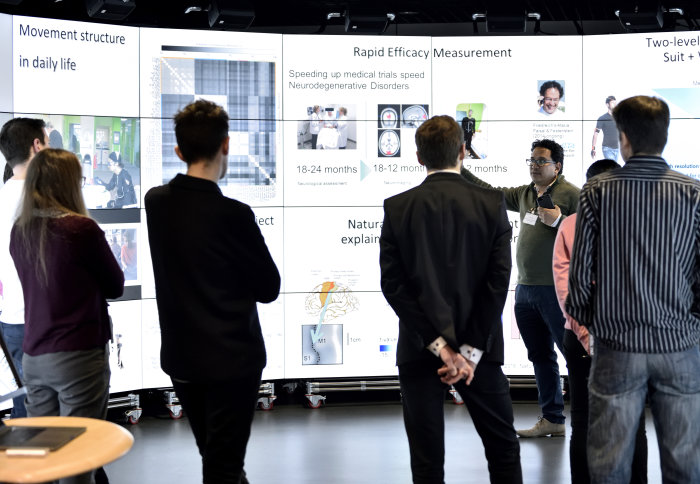Doctoral Training in Artificial Intelligence for Healthcare

On 1st October 2019, the UKRI Centre for Doctoral Training in Artificial Intelligence for Healthcare opens its doors to their first cohort.
The United Kingdom Research and Innovation Centre for Doctoral Training in Artificial Intelligence for Healthcare (AI4Health) will open its doors to the first cohort of PhD students in October. Director Dr Aldo Faisal and the whole AI4Health Team are looking forward to getting started and turning vision into practice.
Imperial College London understand the term “AI” as meaning the development of intelligent systems that embody a practical solution. However, practical solutions involving AI will require a broader approach and the College will drive technical innovation by providing broad training for exploitation of multiple technological strategies within the broader realm of AI.
AI is hard because systems have to be able to cope with unexpected circumstances when solving perceptual, reasoning or planning problems (e.g. due to the diversity and variability of human nature). Moreover, while many AI systems can solve simple or restricted problems (e.g. in video games), they often fail when scaled up to more general settings and cannot operate with unusual situations and adjust accordingly. Thus, our work on AI in Healthcare needs and drives current AI research avenues such as interpretable AI, privacy-preserving learning, trust in AI, data-efficient learning and safety in autonomy. These are key due to the immediate impact on life and health for users depending on AI for healthcare support.
The Research Training Vision
Our CDT in AI for Healthcare addresses training that will enable the UK to tackle two grand technical challenges: creating Generalisable AI and designing it to deliver more Affordable Healthcare. The AI sector and the Healthcare sector have been defined by the UK government as two of four strategic sectors essential for the UK’s future. AI is likely to play a key role in healthcare of the future by providing more accurate decisions faster while reducing cost and suffering across society. The healthcare area requires a large number of AI specialists that are trained to apply their skills in a domain that faces numerous barriers for innovations (e.g. regulatory, ethical, legal and scientific hurdles).
Thus, AI training in our Centre will generalise across a whole spectrum of AI application scenarios far beyond healthcare. Our Centre will train a new generation of PhD-level innovators. Tackling healthcare challenges requires learning how to bridge our understanding of the clinical language and methodologies, the regulatory, legal and ethical frameworks of healthcare with core AI technical skills. Our training outcomes are PhDs that have learned to move fluidly across the disciplinary AI/healthcare boundaries and can develop and implement deployable solutions. Crucially, the College will empower our alumni through our unique training program to become independent actors in the highly regulated healthcare technology market and enable them to consolidate their impact through our NHS partnerships and globally through our international industrial partners so as to become part of the long-term legacy of our UKRI Centre.
The PhD students who are training on the CDT AI4Health, together with the collaborating with teams of leading AI and Healthcare experts, clinical professionals and industry partners will form the first group of next-generation researchers, paving new ways of innovation, entrepreneurship and collaborations with aim to specialise in applications of AI and machine learning to healthcare.
The Centre’s ultimate vision is improving patient’s care and wellbeing by providing more accurate decisions on their clinical care faster. The CDT will deliver training integrating the development of technical skills with an appreciation for approaches to ‘AI design that is socially and ethically acceptable and put people at its centre. Here are a few examples of research projects that students will work on to highlight the interdisciplinary nature of the CDT:
“Predicting patient outcomes from heart motion” by Professor Daniel Rueckert (Department of Computing) and Dr Declan O’Regan (Institute of Clinical Sciences);
“Machine-learning of highly-descriptive temporal features to personalise brain stimulation of essential tremor patients” by Professor Mauricio Barahona (Department Mathematics) and Dr Nir Grossman (Department of Brain Sciences)
The Training Programme
The Centre will provide a training programme aiming to train 100 PhDs and clinical PhD fellows in 5 cohorts starting annually over the next 5 years. Students will benefit from an integrated training, which is enabled by a co-creation process, which means PhD students are paired with AI and Healthcare supervisors as well as industry and healthcare partners - three NHS Trusts treating over 2Mio patients annually (Academic Health Science Centres: Imperial Healthcare NHS Trust, Royal Brompton & Harefield NHS Foundation Trust, Royal Marsden NHS Trust) as well as dozens of industry partners. The up to 4-year long PhD training program is split into three phases that provide underpinning skills and research depth (Foundation phase), research (Research Phase) and finally, drive PhD impact (Impact phase). Student-led training complement courses and workshops in AI and healthcare.
Ultimately, The UKRI CDT in AI for Healthcare brings together the established strength of world-class investigators and the whole supervisory team in leading cross-disciplinary research spanning AI and healthcare. The PhD cohorts will consist of researchers and clinicians of various background and expertise and because of that, they will foster strong collaborations and understanding between developing and applying AI approaches and technology, and thus offering a unique, stimulating environment where students can learn from each other, complimenting skill and cognitive diversity.
Article text (excluding photos or graphics) © Imperial College London.
Photos and graphics subject to third party copyright used with permission or © Imperial College London.
Reporter
Mr Ahmed Idle
Department of Computing